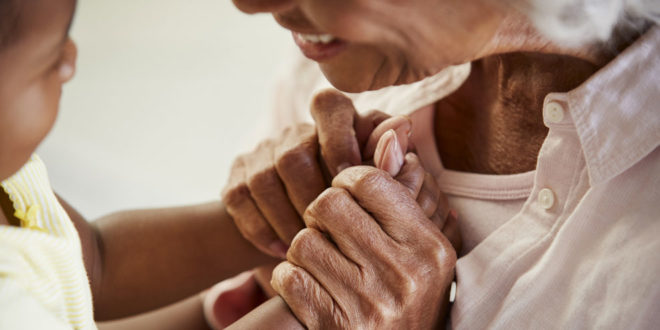What was it that made her so special? In a word: acceptance. She had a way of helping me to feel that I was okay with her just as I was at that moment. Even when I exhibited behaviors she wasn’t wild about, I always felt accepted. She died in 1984 at the age of 88 (way too soon for me), and her nurturing influence in my life lingers like a rare perfume.
Perhaps that’s why I have such a soft spot in my heart for grandparents in general, like the one who stood in the checkout line ahead of me recently. From a brief conversation I gleaned the information that she was looking for birthday cards for twin granddaughters. Expressions of happiness, sadness, and frustration passed across her lined face as she remarked, “Wish I could give them something really nice.”
And then there was the elderly gentleman who was wandering the aisles of Walmart looking to purchase gifts for his grandchildren. “Eleven of ’em” he said in response to my question, “between the ages of three and 23.” He moved on, muttering more to himself than to anyone else, “…suitable gifts that I can afford.”
Sometimes grandparents lament that on a fixed income they don’t have much of value to give their grandchildren. Nothing could be further from the truth! Grandparents can provide a legacy of inestimable value.
For example, studies have shown that a healthy balanced sense of self-worth forms one of the foundation blocks for successful living. Self-esteem levels in children are fairly high during grade school but rapidly decline by the time they finish high school. The decline is even more pronounced in girls than in boys. Even when parents understand this typical self-esteem slide, and devote time to this important area of personal growth, grandparents can enhance and facilitate the process. They often have a major impact on the quality of a child’s life.
Grandparenting is both an art and a science. Think of it as a type of generational mentoring. And you don’t even have to be biologically related to your “grandchild!” You can be a grandparent to children whose own grandparents have died, or who live a great distance away, or who are otherwise unable to offer their grandparenting skills.
What can you do specifically? Here are six practical suggestions to consider:
1. Affirm your grandchild
Make comments such as, “You are a unique person and I am so happy you are part of this family.” If the child violates personal or family boundaries, offer course correction without devaluation. Critique the performance without criticizing the performer. Reward efforts even when outcomes are less than desirable. Help the child to understand the difference between “Oops, I made a mistake,” (one example of healthy shame) versus “I am a mistake” (the quintessential definition of unhealthy shame). If you never had the opportunity to learn about affirmations or sensory preference and consequently were unable to relate to your own children in an optimum manner that matched their innate giftedness, you can certainly study those topics now. You can hone an affirming communication style and nurture your grandchild in his/her sensory preference (e.g., auditory, kinesthetic, visual).
2. Engage in Active Listening
Ask questions such as, “What do you want to be when you grow up?” “Tell me how you feel about war?” “What thoughts do you have about a Higher Power?” “Tell me about your best friend.” Then shut up and listen. I mean clamp your lips together and stay centered on the child without allowing your mind to wander. Listen in an open, encouraging, nonjudgmental way, thus providing an opportunity for the child to verbalize hopes, fears, and feelings in a safe environment.
3. Teach through storytelling
Tell stories about what it was like when you were a child and when his/her parents were growing up (if you knew them then). Stories are an excellent medium for transmitting health information, generational history, successes, failures, and a whole host of other meaningful experiences that can help the child to feel hopeful about the future and to avoid pitfalls. Explain that daily choices made throughout life influence not only our personal happiness and success–but family outcomes as well. Make sure they understand that mistakes are just stepping-stones to help us learn how to live life more successfully. Let them see you handle your mistakes appropriately and share with them what you learned in the process.
4. Create priceless memories
Relate to the child in a way that makes him/her feel real–a reality as distinct as their fingerprints. Help the child to understand the difference between needs and wants and to learn to prioritize each. Wants (often referred to goals in adulthood) are an important part of life. Without them, the child may be satisfied with the status quo and never become the person he/she was designed to be. Encourage the child to set and achieve realistic goals, and to realize some wants. They are those little extras that add euphoria to life and create pleasant memories that can last a lifetime. Remember that the brain tends to imprint experiences that involve strong emotions, whether they are happy or sad!
5. Empower your grandchild
Inspire the child to believe he/she can make a difference in this world. When abuse is present in the environment, children tend to grow up unempowered as a consequence of deficient personal boundaries. Be willing to risk speaking out if you suspect physical, mental, emotional, spiritual, or sexual abuse. Grandchildren are fountains from which the next generation springs. You need to do your part to keep the water as pure as possible. Each person lives “downstream” from someone significant in his/her life. Think of your grandchild as living downstream from you. What is the quality of the water when it reaches the child?
6. Live your blueprint
Studies have shown that approximately 75% of the message in a two-party communication is conveyed through nonverbal body language. In other words, do as I do is usually far more convincing than do as I say. When you exhibit a high level wellness lifestyle, in balance, you show your grandchildren that growing older can be exciting, stimulating, and relatively free from disease. When accidents or illnesses do occur, you can live the 20:80 rule: it’s not so much what happens to you that matters, as what you think about what happens to you and how you respond.
Can you as grandparents really make a difference? More than you may know! You can help fill your grandchild’s love cup, and thereby positively influence the future of the child, of the culture, and of the global village. And you can do so without having to spend a penny of hard, cold cash!
Through positive grandparenting you can pass along a gift that no one else can give, because you are providing quality time and your unique perspective. It’s something that will continue through time and space, with potentially exponential results that you won’t even live long enough to observe. Give the gift that keeps on giving. Start now!
If you enjoyed this you may like We Have Been Robbed | How to Be a Good Grandmother
Arlene Taylor, PhD, writes from Northern California.
© 2002 - 2025, AnswersForMe.org. All rights reserved. Click here for content usage information. Answers for Me Support & encouragement for every-day life
Answers for Me Support & encouragement for every-day life



